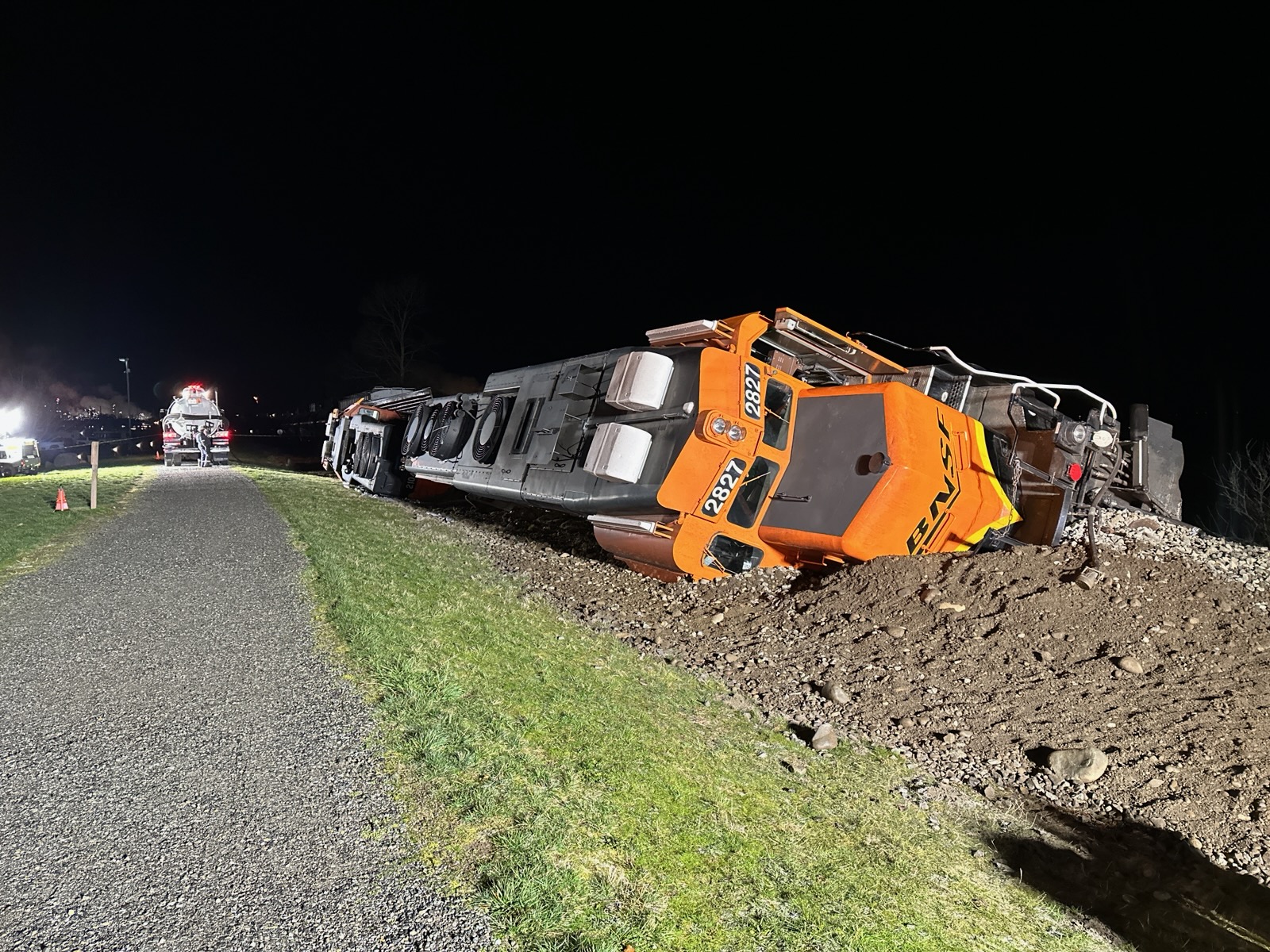
- Details
- By Chez Oxendine
A BNSF Railway train derailed early Thursday morning on the Swinomish Reservation near Anacortes, Wash., spilling about 2,500 gallons of diesel, according to the Washington State Department of Ecology.
Department of Ecology spokesperson Scarlet Tang told Native News Online the train derailed on a berm near the Padilla Bay, but most of the subsequent spillage occurred on the “land side,” away from nearby water sources. Pollution prevention teams quickly put up booms to prevent further pollution.
Subsequent study of the area produced no immediate apparent impact on the wildlife or water near the derailment site, Tang said. Diesel pooled on top of the soil has since been collected and a BNSF team is on the way to pull up rails near the crash, treat the soil below them, and then replace the rails “over the next 36 hours,” Tang said.
Washington Department of Ecology officials initially estimated 5,000 gallons of diesel had spilled, then revised that estimate to "no more than 2,500 gallons spilled on the soil." A BNSF Railway spokesperson disputed the initial estimate and characterized the spill as "minimal" in a statement to a local NPR station.
Tom Wooten, Chairman of the Samish Indian Nation who call the Swinomish Reservation home, said he was “thankful” no one was injured, but that the derailment indicated deeper issues with railway infrastructure in the United States — a sentiment borne out by a rash of derailments in recent months, including a high-profile environmental disaster in East Palestine, Ohio.
“This spill, while it may not be considered large through an environmental lens, signals a larger infrastructure issue as this is happening more and more frequently across the country,” Wooten said in a statement. “Our top priority should be evaluating the maintenance of our infrastructure while hauling hazardous materials and continuing to wean away from fossil fuels and preserving our native lands."
Just a few hours before the derailment on the Swinomish reservation, another BNSF train carrying corn syrup derailed near Topock, Ariz. There were no injuries in that incident, but the derailment of eight train cars closed the tracks according to local media reports.
“This stuff happens every single day … This is kind of heightened because of the Ohio derailment and that’s what’s on everybody’s mind,” Ty Keltner, an Ecology spokesperson, told the Seattle Times, referencing last month’s derailment of the Norfolk Southern freight train carrying hazardous materials in East Palestine, Ohio.
Fort Worth, Texas-based BNSF Railway is one of North America’s largest freight transportation companies, with a rail network of 32,500 route miles in 28 states and three Canadian provinces.
Native News Online reached out to BNSF, but has not heard back as of this evening.
Editor's note: This story has been updated Thursday evening with information from a Department of Ecology spokesperson, including plans to treat soil and replace damaged rails over the next day and a half.
More Stories Like This
Gwich'in Tribal Governments Submit Comments Challenging Fish and Wildlife Service's Inadequate Environmental Review of Arctic Refuge Snow RoadRappahannock Tribe Challenges 9M-Gallon Water Plan
Feds release draft long-term plans for Colorado River management
Apache Leader Walks 60 Miles to Court Hearing That Will Decide Fate of Sacred Oak Flat
Rappahannock Tribe Raises Sovereignty and Environmental Concerns Over Caroline County Water Permit
Help us defend tribal sovereignty.
At Native News Online, our mission is rooted in telling the stories that strengthen sovereignty and uplift Indigenous voices — not just at year’s end, but every single day.
Because of your generosity last year, we were able to keep our reporters on the ground in tribal communities, at national gatherings and in the halls of Congress — covering the issues that matter most to Indian Country: sovereignty, culture, education, health and economic opportunity.
That support sustained us through a tough year in 2025. Now, as we look to the year ahead, we need your help right now to ensure warrior journalism remains strong — reporting that defends tribal sovereignty, amplifies Native truth, and holds power accountable.
 The stakes couldn't be higher. Your support keeps Native voices heard, Native stories told and Native sovereignty defended.
The stakes couldn't be higher. Your support keeps Native voices heard, Native stories told and Native sovereignty defended.
Stand with Warrior Journalism today.
Levi Rickert (Potawatomi), Editor & Publisher


